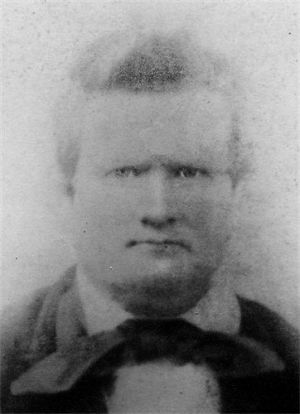Benjamin Worthington: Difference between revisions
(1st pass) |
No edit summary |
||
| (3 intermediate revisions by the same user not shown) | |||
| Line 1: | Line 1: | ||
'''Benjamin Pinckney "Pink" Worthington''' (born [[November 19]], [[1814]] in Kentucky; died [[November 19]], [[1884]] in [[Birmingham]]) was a pioneer plantation owner in what is now [[Birmingham]] and an investor in the [[Elyton Land Company]] which developed the city. | [[Image:Benjamin Worthington.jpg|right|thumb|Benjamin Worthington]] | ||
'''Benjamin Pinckney "Pink" Worthington, Jr''' (born [[November 19]], [[1814]] in Hopkinsville, Kentucky; died [[November 19]], [[1884]] in [[Birmingham]]) was a pioneer plantation owner in what is now [[Birmingham]] and an investor in the [[Elyton Land Company]] which developed the city. | |||
Worthington, | Worthington was the son of Benjamin Worthington, Sr and Judith Stedman Worthington of Christian County, Kentucky. He came to [[Alabama]] and married the former [[Caroline Worthington|Caroline Mitchell]] on [[May 11]], [[1843]]. They had 11 children and lived on an 800 or 1,000 acre farm in what are now the [[Lakeview]] and [[Avondale]] districts of Birmingham. He constructed a [[Benjamin Worthington residence|2-story 8-room mansion]] with a broad six-column veranda on the front at the location which later became the intersection of [[30th Street South|30th Street]] and [[6th Avenue South]]. The house was furnished with spring water piped from what is now [[Rushton Park]]. Among his other crops, Worthington planted a peach orchard near his home which was later purchased as the site of [[Trinity Methodist Church (Southside)|Trinity Methodist Church]]. | ||
At the conclusion of the [[Civil War]], Worthington made plans to move with his family to South America. His ship was wrecked off the coast of Cuba, however, and after two years in Florida he returned to his plantation in [[Jefferson County]]. | At the conclusion of the [[Civil War]], Worthington made plans to move with his family to South America. His ship was wrecked off the coast of Cuba, however, and after two years in Florida he returned to his plantation in [[Jefferson County]]. His oldest daughter, [[Betty Nabers|Betty]] married [[William Nabers]] and settled on the adjoining Nabers plantation. Another daughter, [[Alice Nabers|Alice]], married [[Zachariah Nabers, Jr]]. | ||
When approached by the organizers of the Elyton Land Company, Worthington agreed to sell | When approached by the organizers of the Elyton Land Company, Worthington and William Nabers agreed to sell portion of their lands. For Worthington's contribution, sometimes referred to as [[Pink Worthington's frog pond]], he was granted 133 shares in the company. Worthington was also a founding director of the [[National Bank of Birmingham]], into which he invested $50,000. | ||
Worthington died on his 70th birthday and is buried at Birmingham's [[Oak Hill Cemetery]]. | Worthington died on his 70th birthday and is buried at Birmingham's [[Oak Hill Cemetery]]. | ||
==External links== | |||
* [http://www.findagrave.com/cgi-bin/fg.cgi?page=gr&GRid=7026864 Benjamin Worthington] at Findagrave.com | |||
{{DEFAULTSORT:Worthington, Benjamin}} | {{DEFAULTSORT:Worthington, Benjamin}} | ||
Latest revision as of 15:51, 19 March 2015
Benjamin Pinckney "Pink" Worthington, Jr (born November 19, 1814 in Hopkinsville, Kentucky; died November 19, 1884 in Birmingham) was a pioneer plantation owner in what is now Birmingham and an investor in the Elyton Land Company which developed the city.
Worthington was the son of Benjamin Worthington, Sr and Judith Stedman Worthington of Christian County, Kentucky. He came to Alabama and married the former Caroline Mitchell on May 11, 1843. They had 11 children and lived on an 800 or 1,000 acre farm in what are now the Lakeview and Avondale districts of Birmingham. He constructed a 2-story 8-room mansion with a broad six-column veranda on the front at the location which later became the intersection of 30th Street and 6th Avenue South. The house was furnished with spring water piped from what is now Rushton Park. Among his other crops, Worthington planted a peach orchard near his home which was later purchased as the site of Trinity Methodist Church.
At the conclusion of the Civil War, Worthington made plans to move with his family to South America. His ship was wrecked off the coast of Cuba, however, and after two years in Florida he returned to his plantation in Jefferson County. His oldest daughter, Betty married William Nabers and settled on the adjoining Nabers plantation. Another daughter, Alice, married Zachariah Nabers, Jr.
When approached by the organizers of the Elyton Land Company, Worthington and William Nabers agreed to sell portion of their lands. For Worthington's contribution, sometimes referred to as Pink Worthington's frog pond, he was granted 133 shares in the company. Worthington was also a founding director of the National Bank of Birmingham, into which he invested $50,000.
Worthington died on his 70th birthday and is buried at Birmingham's Oak Hill Cemetery.
External links
- Benjamin Worthington at Findagrave.com
